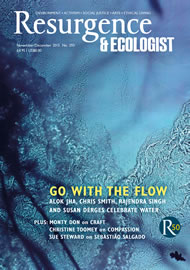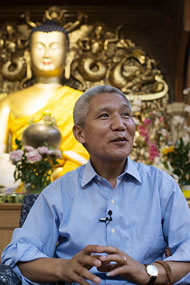Thupten Jinpa remembers waking up as a small boy in smoky tents in refugee settlements in remote parts of northern India to the undulating sound of his mother chanting prayers as she churned Tibetan butter tea for breakfast. It was the early 1960s and his parents had been put to work building roads in these border regions after fleeing Tibet following the invasion of their homeland by Chinese troops and the Dalai Lama’s escape into exile.
As his mother turned the vertical wooden tube holding the tea, it would make a soothing, repetitive, gushing noise that followed the rhythm of her prayers. One prayer that Jinpa remembers his mother often chanting is known as the ‘four immeasurables’ in Tibetan Buddhism. At the heart of the second line of this prayer – “May all beings be free of suffering and its causes” – is the key Buddhist principle of compassion.
More than five decades on from those childhood days, Jinpa has written a moving book called A Fearless Heart: Why Compassion is the Key to Greater Wellbeing. It outlines a landmark initiative he has spent years developing at Stanford University’s Center for Compassion and Altruism Research and Education (CCARE), which he helped found. This initiative takes the form of a standardised eight-week secular training course called Compassion Cultivation Training (CCT), which Jinpa describes as a way of training the compassion “muscle” that is innate to us all. In the wake of so much coverage of mindfulness in the global media in recent years, he describes this course as “the next step on from mindfulness training”.
Mindfulness training, in the classical Buddhist tradition, is something that Jinpa became a master at after ordaining as monk when he was just 11 years old. As a talented scholar, he went on to become the Dalai Lama’s principal English translator, which he has remained for the past 30 years, translating and editing books such as the 1999 New York Times best seller Ethics for the New Millennium.
His academic flair eventually led him to study for a PhD at Cambridge University, followed by his work at Stanford University and a current position as an adjunct professor at McGill University in Montreal, where he now lives with his wife and two daughters after disrobing in the 1980s. In addition, he now chairs the highly regarded Mind and Life Institute, dedicated to fostering creative dialogue between Buddhist tradition and Western science. This track record in both the monastic tradition and the secular world has given Jinpa a down-to-earth perspective on the challenges we all face in life.
Shortly after the publication of A Fearless Heart in the UK earlier this year, I sat with Jinpa in an airy room of the Jamyang Buddhist Centre in Lambeth, south London, to discuss the way in which he believes compassion training can take mindfulness to the next level. “Mindfulness in itself is not adequate,” he said bluntly, describing the practice as a personal and sometimes solitary exercise. “It opens the door to greater awareness and understanding. But compassion training brings this out into the world; it is all about how we relate to one another.”
Backed by scientific research, Jinpa challenges the long-held narrative that explains behaviour as principally motivated by self-interest. Humans are “meaning-seeking creatures” whose sense of wellbeing and self-worth depends on how we connect with others, he argues. “Even Darwin himself said that evolution theory would stand or fall based on how well it will explain the phenomenon of altruism.”
In this, Jinpa’s work chimes with a growing body of research and initiatives highlighting and promoting the importance of compassion and altruism. (See panel.) For while the theory of survival of the fittest and the selfish gene became a predominating influence in scientific thinking from the 19th century onwards, in recent years far more attention has been paid to the role of biological altruism and the importance of generosity rather than selfishness in permitting living beings to thrive.
As the double Pulitzer prize-winning author and naturalist E.O. Wilson has concluded, altruism “cannot be explained away by genetic greed”. His work has shown that, while within groups selfish individuals may beat altruistic individuals, on a wider spectrum “groups of altruists defeat groups of selfish individuals”.
“Within the scientific community there are now very few dissenting voices about compassion being fundamental to human drives and motivation,” Jinpa concurs.
But while science has made great strides in treating mental pathologies and neuroses, far less research has been conducted into the positive qualities of the human mind. This, then, has been the focus of those working at Stanford’s CCARE. And as Jinpa writes in A Fearless Heart, “It’s a paradox of compassion that we ourselves are one of its greatest beneficiaries.” For science has now shown that, in addition to an improvement in psychological welfare, a shift in focus from a narrow self-agenda has proven medical benefits. The release of the hormone oxytocin that comes with the warm feeling we get from exercising compassion, for instance, has been associated with reduced levels of inflammation in the cardiovascular system, thus reducing stress and the risk of heart disease.
Over the past 20 years, tools for looking at the human brain have become much more sophisticated, with neuroimaging giving scientists the language to understand the phenomenon of neuroplasticity and how experience can shape the brain. Such research has helped those at Stanford develop an eight-week Compassion Cultivation Training (CCT) programme, modelled initially on the structure of Jon Kabat-Zinn’s Mindfulness-Based Stress Reduction (MBSR) course, which sparked the current worldwide mindfulness phenomenon.
As with such MBSR programmes, CCT involves weekly two-hour classes in which participants are guided through a series of meditation practices to help develop a greater awareness and understanding of the dynamics of thought processes, emotions and behaviour. In addition, various ‘homework’ exercises are given to encourage the use of everyday circumstances as a way of developing natural feelings of empathy for others from a passive stance to a more active standpoint from which to relate to the world: a way of becoming motivated and actively engaged in seeing the suffering of others relieved.
Much in the same way that Kabat-Zinn’s MBSR programme initially gained momentum as a means of helping those dealing with chronic pain, the Stanford teams’ CCT course is also now being pioneered in the United States to support those suffering with chronic illness. In addition, it is being used to help ex-military personnel suffering from post-traumatic stress disorder, and has so far been adopted by a major private health-care group in San Diego, the engineers of Google, and students at Stanford Business School. Researchers have begun to look too at how the course could be adapted for use in schools.
As Thupten Jinpa writes at the beginning of A Fearless Heart, quoting the French poet and novelist Victor Hugo, “Nothing is more powerful than an idea whose time has come.” For compassion, it seems, that time is now.
OTHER COMPASSION INITIATIVES
The Charter for Compassion
Launched by the theologian and author Karen Armstrong in 2009, and drafted by a multi-faith, international council of thinkers and leaders, the charter has been conceived as a “global force for good … to establish compassionate thinking and action at the heart of religious, moral and political life.” Amongst the charter’s initiatives is a Compassionate Communities campaign, to which more than 80 communities around the world have so far signed up, requiring them to come up with a detailed 10-year plan to promote acts of compassion. In October 2015 a two-day Working Conference on Compassion was organised in Shrewsbury, Shropshire – significantly Charles Darwin’s birthplace – to bring together an international panel of leading experts and thinkers in the field of compassion, including poet and author Ruth Padel, Darwin’s great-great-granddaughter.
The Dalai Lama Centre for Compassion
Founded in Oxford early in 2015 as a secular “interdisciplinary ethics research centre concerned with advancing humanity’s understanding of compassion and related values”.
The Oxford Mindfulness Centre, University of Oxford
This year it added a masterclass in compassion to its curriculum to cultivate “a deeper understanding of compassion and its place in mindfulness-based cognitive therapies”.
Mindful Nation UK
In January, the Mindfulness All-Party Parliamentary Group (MAPPG) launched its interim Mindful Nation UK report, outlining proposals on how public policy could make Britain a more mindful nation, with calm, ethical and compassionate qualities.
A Fearless Heart: Why Compassion is the Key to Greater Wellbeing by Thupten Jinpa is published by Piatkus.







